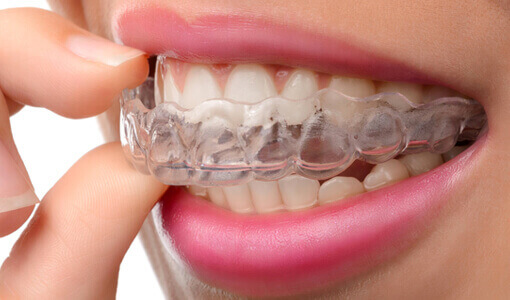What is a night guard and how does it help protect the teeth?
A night guard is basically a plastic device that you wear over the period of the night. It's usually designed for people who clench or grind their teeth at night, which can cause damage to the teeth, the bone around the teeth, and the meniscus in your joint. Wearing a night guard overnight can help protect against this damage.
What are the most common reasons someone needs a night guard?
If you're clenching your teeth at night, you're practically destroying the meniscus, which is a cushion in the joint between the upper and lower jaw. This can be very painful and can also damage your teeth. Those are the reasons to protect your teeth, joints, and surrounding bone by using a night guard.
How does the night guard help to protect the teeth overnight?
The night guard separates your teeth and acts as a cushion between the upper and lower teeth. It is usually worn on one jaw, either the top or the bottom, and it separates your teeth enough to prevent damage to the teeth or joint.
Can the night guard reduce the amount of clenching or the force applied?
No, wearing a night guard won't stop you from clenching your teeth, but it will protect your teeth from damage.
What are the benefits of using a night guard for TMJ?
TMJ stands for temporomandibular joint. The night guard forces the joint into a rest position, protecting it from being crushed. This helps prevent the destruction of the meniscus, which can be very painful.
Can a night guard help with snoring or sleep apnea?
No, a night guard is not the device for that. If you have sleep apnea, it's important to see a doctor. Snoring is usually caused by a soft palate closing the airway, and a night guard won't help with that.
What are the differences between over-the-counter or custom-made night guards?
A custom-made night guard is specifically designed for you, can withstand more pressure, and fits better. Over-the-counter guards are made for everyone and may not position your jaws correctly, which can cause issues.
Are there specific night guards for clenching or grinding?
No, a night guard is a night guard and can protect against both clenching and grinding.
How do I know if I need a custom night guard?
If you're clenching or grinding your teeth, or if you wake up with tired muscles or pain in your teeth, you might need a night guard. A dentist can help determine that.
How do I properly clean a night guard?
Keep it in water to prevent odor, and use special tablets like Fident to clean it. You can also brush it with soap and water or use sanitation devices.
How often should a night guard be replaced?
If you see cracks or holes in the night guard, it's time to replace it.
Are night guards expensive, and does dental insurance cover them?
Few dental insurances cover night guards, and most require you to pay most of the cost. You should check with your dentist or contact us to see if your insurance covers it.
Can children or teenagers wear a night guard?
It's not recommended because their jaws are still developing, and a night guard could prevent proper growth.
What should I do if my night guard doesn't fit properly or causes discomfort?
You should see your dentist or contact us if you don't have one, and we'll help you out.

Night Guards and Bruxism Explained
Night Guards are recommended for patients who suffer from bruxism (teeth grinding). Bruxism usually happens while people are asleep and clench their teeth. Bruxism can be painful for some and others may not even realize they are grinding their teeth. The following factors contribute to how much pain bruxism can cause:
- How much stress you are under
- How long and tightly you clench and grind
- Whether your teeth are misaligned
- Your posture
- Your ability to relax
- Your diet
- Your sleeping habits
At Steinway Family Dental Center we custom fit a night guard for each individual patient. These simple devices can protect the surface of your teeth, and prevent severe jaw pain. Night guards allow you to be more conscious of the movement of your teeth, especially the tendency to clench. This is why night guards are the recommended choice for patients with bruxism.
Mouth Guards
Mouth guards should be used by anyone who plays contact sports. Using a mouth guard, can help limit the risk of mouth-related injuries to your lips, teeth, tongue, and soft tissues of your mouth. Mouth guards also help you avoid chipped or broken teeth, nerve damage to a tooth and even tooth loss. Usually, mouth guards are only made to cover your upper teeth however if you wear braces, your dentist can make a mouth guard for the lower teeth as well.

